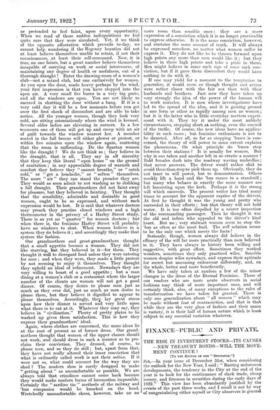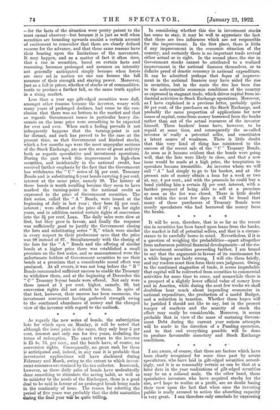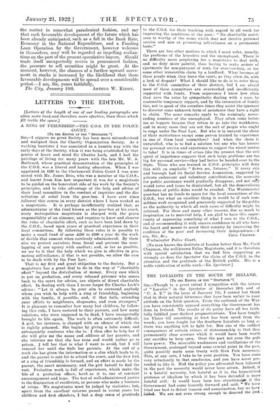FINANCE—PUBLIC AND PRIVATE.
THE RISE IN INVESTMENT STOCKS—ITS CAUSES —NEW TREASURY BONDS—WILL THE MOVE- MENT CONTINUE ?
[To THE EDIT011 Or THE 0 SPECT1TOE."] SIR,—In your issue of December 31st, when considering the outlook for the New Year, I said : " Barring unforeseen developments, the tendency in the City at the end of the year is to look for the continuance of slack trade, cheap money, and firmness in securities during the early days of 1922." This view has been abundantly justified by the events of the past three weeks, and I recall it not by way of congratulating either myself or City observers in general —for the facts of the situation were pretty patent to the most casual observer—but because it is just as well when securities are bounding upwards amidst a certain amount of excitement to remember that there are clearly defined reasons for the advance, and that these same reasons have their bearing upon the limitations of the movement. It may happen, and as a matter of fact it often does, that a rise in securities, based on certain facts and reasoning, becomes prolonged and assumes an intensity not generally anticipated simply because when forces are once set in motion no one can foresee the full measure of their strength and staying power. Moreover, just as a fall in prices, whether of stocks or of commodities, tends to produce a further fall, so the same truth applies in a rising market.
Less than a year ago gilt-edged securities were dull, amongst other reasons because the investor, weary with many years of prolonged declines, had come to the con- clusion that there was no bottom to the market and that as regards Government issues in particular heavy dis- counts on the issue price were something to be expected for ever and ever. When such a feeling prevails it not infrequently happens that the turning-point is not far distant, and such has proved to be the case at the present time, so that Government and kindred stocks, which a few months ago were the most unpopular sections of the Stock Exchange, are now the scene of great activity both as regards speculative and investment operations. During the past week this improvement in high-class securities, and incidentally in the national credit, has received further emphasis by the fact that the Government has withdrawn the C " series of 5i per cent. Treasury Bonds and is substituting 5-year bonds carrying 5 per cent. interest at the same price, namely 99. The history of these bonds is worth recalling because they seem to have marked the turning-point in the national credit as expressed in the price of Government securities. The first series, called the " A " Bonds, were issued at the beginning of July in last year ; they bore per cent. interest ; were offered at the price of 97 ; ran for eight years, and in addition carried certain rights of conversion into the 3 per cent: Loan. The daily sales were slow at first, but they grew in favour, and finally the response was sufficiently good to justify the Government closing the lists and substituting series " B," which were similar in every respect to their predecessor save that the price was 98 instead of 97. Simultaneously with the closing of the lists for the " A " Bonds and the offering of similar bonds at a higher price there was established a small premium on the first series, and so unaccustomed were the unfortunate holders of Government securities to see their bonds at a premium that a considerable moral effect was uced. At all events, it was not long before the " B " onds commanded sufficient success to enable the Treasury to withdraw them, and at the beginning of December the " C " Treasury 9-year bonds were offered. Not only were these issued at 1 per cent. higher, namely, 99, but conversion rights did not attach to them. In spite of that fact, however, their success has been enormous, the investment movement having gathered strength owing to the continued abundance of money and the changed view of the investor with regard to the outlook.
As regards the new series of bonds, the subscription lists for which open on Monday, it will be noted that although the issue price is the same, they only bear 5 per cent. interest and only run for five years, including the terms of redemption. The exact return to the investor is £5 4s. 7d. per cent., and the bonds have, of course, no conversion rights. Consequently, no great rush for them is anticipated and, indeed, in any case it is probable that investment applications will have slackened during February and March, owing to the extent to which invest- ment resources are strained by the tax collector Inasmuch, however, as these daily sales of bonds have undoubtedly done something to stimulate the saving habit, as well as to minister to the needs of the Exchequer, there is a good deal to be said in favour of no prolonged break being made in the continuity of issue. The reason for selecting the period of five years was probably that the debt maturities during the. final year will be suite trifling.
I' 34
In considering whether this rise in investment stocks has come to stay, it may be well to appreciate the fact that there are two influences which are not responsible for the improvement. In the first place, there is little if any improvement in the economic situation of the country, and certainly there is no important trade revival either actual or in sight. In the second place, the rise in Government stocks cannot be attributed to a realized improvement in the national finances themselves, or to definite proof of drastic economy in national expenditure. It can be admitted perhaps that hopes of improve- ment in the national finances may have aided the rise in securities, but in the main the rise has been due to the unfavourable economic conditions of the country as expressed in stagnant trade, which drives capital from in- dustrial activities to Stock Exchange operations. Moreover, as I have explained in a previous letter, probably quite 50 per cent. of the purchases on the Stock Exchange, and probably the same proportion of applications for new issues of capital, come from money borrowed from the banks rather than out of the actual resources of the investor himself. These bankers' loans have, however, to be repaid at some time, and consequently the so-called investor is really a potential seller, and constitutes a latent source of weakness. There is little doubt that this very kind of thing has ministered to the success of the recent sale of the " C " Treasury Bonds. As soon as it became evident that the bonds were going well, that the lists were likely to close, and that a new issue would be made at a high price, the temptation to speculate became irresistible. An investor whom we will call " A " had simply to go to his banker, and at the present rate of money obtain a loan for a week or two at, say, 4 per cent., and with the proceeds he could buy a bond yielding him a certain 5 per cent. interest, with a further prospect of being able to sell at a premium as soon as the list was closed. There is little doubt that within the next few days it will be found that many of these purchasers of Treasury Bonds were merely speculators who had borrowed the money from the banks.
* * * * It will be seen, therefore, that in so far as the recent rise in securities has been based upon loans from the banks, the market is full of potential sellers, and that is a circum- stance to be carefully borne in mind. Nevertheless, if it is a question of weighing the probabilities—apart altogether from unforeseen political financial developments—of the rise in investment securities proceeding further, I am bound to say that the arguments in favour of its continuance for a while longer are fairly strong. I will cite them briefly, and my readers must then form their own judgment. Owing to the continued stagnation of trade, it seems improbable that capital will be rediverted from securities to commercial activities for some time to come, and meanwhile there is a prospect of a slightly lower official value of money here and in America, while during the next few weeks we shall doubtless hear much about impending economies in national expenditure, the production of a model Budget, and a reduction in taxation. Whether those hopes will be justified I should not like to say, but in the present temper of markets and the scarcity of stock the effect may easily be considerable. Moreover, it seems probable that in view of the mass of maturing Govern- ment Debt during the current year serious attempts will be made in the direction of a Funding operation, and to that end everything possible will be done to produce favourable monetary and Stock Exchange conditions.
* * **• I am aware, of course, that these are factors which have been clearly recognized for some time past by astute speculators, who have laid in gilt-edged securities accord- ingly, and it is as reasonably certain as can be that at a later date in the year realizations of gilt-edged securities may be on a colossal scale. On the other hand, those speculative investors who have acquired stocks for the rise, slid hope to realize at a profit, are, no doubt basing their view upon the fact that when once the investing public is really aroused to action the absorbing capacity is very great. I can therefore only conclude by expressing the matter in somewhat paradoxical fashion, and say that each favourable development of the future which has been already anticipated, such as a fall in the Bank Rate, Economy in the National Expenditure, and a Funding Loan Operation by the Government, however welcome in themselves, may well be regarded as impelling realiza- tions on the part of the present speculative buyers. Should trade itself unexpectedly revive in pronounced fashion, the pressure to sell securities might be great. At the moment, however, the chances of a further upward move- ment in stocks is increased by the likelihood that these favourable developments will be spread over a considerable period.—I am, Sir, yours faithfully,




































 Previous page
Previous page